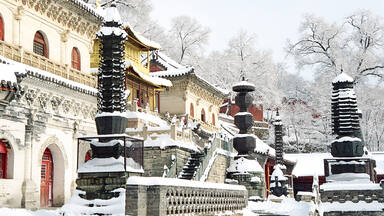Twenty-seven new sites up for inscription on UNESCO World Heritage List as Committee opens session in Seville
The 33rd session of the World Heritage Committee, chaired by María Jesús San Segundo, the Ambassador and Permanent Delegate of Spain to UNESCO, opened today in Seville, Spain. During the session, which ends on June 30, the Committee´s 21 members will review the state of conservation of properties inscribed on UNESCO's World Heritage List and 27 nominations for new inscriptions of cultural and natural sites on the List.
The opening featured addresses by: Ángeles González-Sinde Reig, Spain's Minister of Culture; Koïchiro Matsuura, the Director-General of UNESCO; José Antonio Griñán, President of the Autonomous Government of Andalusia; Alfredo Sánchez Monteseirín, Mayor of Seville; George N. Anastassopoulos, President of UNESCO's General Conference; and Olabiyi Babalola Joseph Yaï, Chairman of the Organization's Executive Board.
In his address, the Director-General took stock of developments in UNESCO's World Heritage work, since he chaired the World Heritage Committee in 1998 (Kyoto, Japan) and over the following 10 years as he headed UNESCO, a post he will leave at the end of his term, in November this year.
"Over the last ten years, I have had great satisfaction from observing the achievements of the Committee, as well as the growing challenges for the States Parties in protecting World Heritage and the achievements of UNESCO in responding to the growing concerns of national and local authorities, site managers, research institutes, development agencies, the media and the general public."
"The 177 reports on the state of conservation of sites that will be submitted to your review over the week, illustrate the extent of the challenges facing the Committee," he said. Other challenges highlighted by Mr Matsuura included the need to ensure that all States Parties (shortly to number 187) are represented on the List, to improve geographical balance and correct the imbalance between the number of cultural and natural sites, as the former far exceed the latter.
"If today we must unite our common will to preserve the shared heritage of humanity, it is because neglect and Barbary have not disappeared, it is because the situation is still urgent," said Spain's Culture Minister. "Thus, the objective of the meeting of the World Heritage Committee of UNESCO, is not only characterized by the heavy work load of its agenda, but by the mission that brings us together: by the appeal we issue today to revive and raise the flame of culture, in the face of crises and uncertainties."
The Chairperson of the World Heritage Committee outlined the achievements of the 1972 World Heritage Convention on the eve of its 40th anniversary and its "quasi universal" ratification (with 186 States Parties, soon to be 187). "It is right to consider this Convention as an outstanding example of effective multilateralism, proof that when we work together the 186 States Parties are stronger than when they work in isolation." Ms San Segundo continued: "In today's world, subject to constant and rapid change, an integrated, effective and solid policy of heritage conservation needs to dovetail with local strategies of sustainable development."
The opening ceremony ended with a presentation of the recommendations of the World Heritage Youth Forum.
Contacts
Roni Amelan, r.amelan@unesco.org
In Seville until 30 June: +33 (0) 61 54 30 212
Lucía Iglesias Kuntz (Spanish):
l.iglesias@unesco.org
In Seville until 30 June: +33(0)61 46 95 498
Gina Doubleday (Paris)
g.doubleday@unesco.org
+33 (0)1 45 68 16 60

